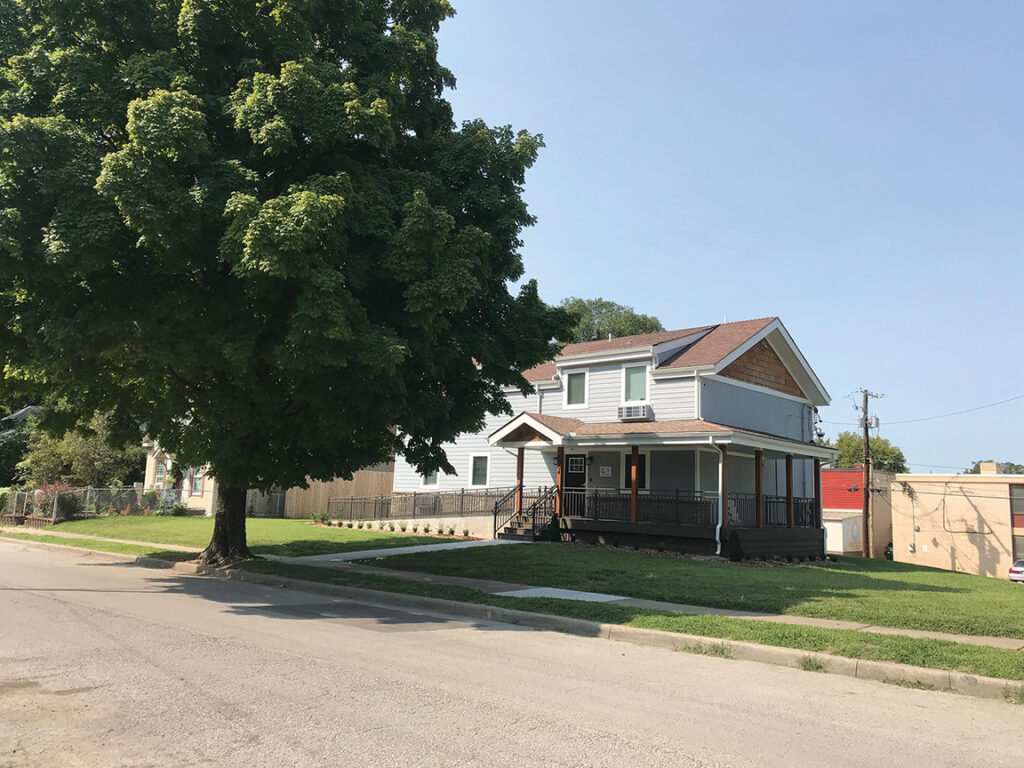
Abby Hoover
Managing Editor
Sheffield Place, a rehabilitation center and home for single mothers and their children, unveiled its much anticipated group living space on September 9 in the newly renovated building at 1004 Newton Ave.
The building was purchased by Sheffield Place in early 2020 from Our Lady of Peace Catholic Church. It was once a former convent for the nuns who taught at what was then St. Stephens Elementary School, located just behind the property.
Sheffield Place began its mission of serving homeless mothers and their children in the Kansas City area in 1991, providing trauma informed care and other support. Since its opening, the non-profit has served over 1,200 families in this pursuit, from homelessness to self-sufficiency. With this new housing expansion, the organization will increase the number of families they are able to serve by over 30 percent.
The house itself is divided into seven units. There are four living units on the second floor, three living units on the first, a communal space and kitchen on the first floor, and a basement. Each of the units will have a private bath, institutional bunk beds and dressers.
The units vary in size and shape. The smaller units can hold a family of two to three, while the larger units can hold up to four people. Hanzlick said the organization’s main building, located at 6604 E. 12th St., will continue to serve any families larger than that.
Each unit will also be outfitted with an apartment-sized refrigerator and a microwave, while the rest of the cooking essentials will be located in the communal kitchen for the residents to share. The plan, Hanzlick said, is to also add a table in the communal area to seat six to eight people, and a television.
Sheffield Place also owns 10 single-family homes in the neighborhood, four are located right on Bennington between Sheffield Place and 11th Street, one near Paseo Academy, and the rest located on 12th Street and 13th Terrace, all within half a mile of the main building.
“It’s still the same program, it’s just a little higher level of autonomy,” said David Hanzlick, Sheffield Place Director of Program and Development. “It’s the second, and then the next step is moving into permanent housing in the community, whether market rate or Section 8 public housing, or one of our 10 units of single-family housing.”
Just like with any of the Sheffield properties, families can stay in the house for as long as they want to, Hanzlick said. Sheffield Place will continue to offer ongoing services, such as case management therapy, as long as they comply with program requirements.
Sheffield’s main building is only 0.2 miles away from this new expansion. This makes it easy for the families located in the new building to still access the groups, activities and resources located at the main facility, Hanzlick said.
By the time this building is fully implemented and renovations are complete at its main building, Sheffield Place will be able to serve 172 families a year, compared to the 131 families it served in 2020.
At the main building, -address-, prior to the renovation 14 of the 17 housing units were original from when the building first opened in 1991, so they set in motion a top-to-bottom renovation of each floor to make repairs to the bathrooms and the three communal kitchens.
Now, with only one floor still under construction, the Sheffield Place staff anticipates soon returning to full capacity.
“The Sheffield mission is to assist homeless mothers and their families as they heal from trauma and important self sufficiency,” Board Chair Susan Escher said. “And with this new expanded facility we can serve more families, we are very excited about that… Thank you so much to the community and everyone, all the donors, for your generous support.”
“We’ve been talking about expanding – it seems like forever, but for at least the last 11 years – we’ve been working towards expanding the residential program so that we can continue to provide services for our clients and be responsive to their needs to really get stable, move forward and be part of a bigger community,” said Kelly Welch, President and CEO of Sheffield Place. “This is a huge step towards that, in addition to providing seven units of additional residential space for moms and their kids.”
The SEVI House – an acronym for strong, empowered, valued and inspired – is catty corner to the Sheffield Community Orchard, a Giving Grove project. Sheffield Neighborhood Association President Mark Morales said the mothers and their children have volunteered in the orchard in the past.
Morales, a member at Our Lady of Peace, was instrumental in securing the building, working with Sheffield Place to make the case to the City and the diocese.
“You know, I just like to see adaptive reuse,” Morales said. “We don’t want to see any abandoned buildings, but if it’s to benefit the neighborhood community, we’re all for it. This year just sat a decade, and it was kind of a money grab from our finances over the parish, but we were able to make it a win-win.”
Morales said the sale of the building saved the parish from death. He hopes filling the vacancy will help deter crime, too.
“We did have a problem with people breaking in here, just trying to get the air conditioner, just to get in – we even had some people that experienced homelessness coming inside here, but we were able to address that need by selling,” Morales said. “I’m looking for Sheffield Place to expand, too, maybe buy some vacant lots, do some construction.”
Welch said although they’ve been planning to expand forever, they got a huge push from donors and supporters, reaching their capital campaign goal in just a few months.
“We are looking to continue to expand during the pandemic,” Welch said. “Our calls for services kind of went up and down – and I couldn’t really tell you why, exactly or what the pattern was – but we’re back, being very much in demand, and we’ve had more than 600 calls for service year to date.”
Last year they had 724 calls for service, so they’re back on track with pre-pandemic numbers.
“What we are finding is that because a lot of other services have been either shut down or not able to do as much as they had in the past, clients have more needs, and so we’ve really tried to step up to address those,” Welch said.
They recently purchased a vacant lot across from the main facility and hope to get the vacant house next to it soon to continue expanding in the neighborhood.
“All of the families we take, the women have multiple barriers to success,” Hanzlick said. “They almost all come out of backgrounds of generational poverty, generational addiction, generational chaos. Most have experienced domestic violence. Their lives have been so difficult that they tend to self-medicate, so you’ve got addiction issues in addition to mental health issues – anxiety, depression, PTSD, all those things.”
Sheffield Place’s role is to help them overcome and heal from trauma, and help them gain the skills they need to become self-sufficient, Hanzlick said. Many of the women have never seen a healthy relationship or positive parenting.
Hope, mother of two and resident at SEVI House, moved into the new living space about three weeks ago, but has been at Sheffield Place for nearly four months.
“I have the most support from the most loving and kind and caring staff I have ever met,” Hope said. “I had been through a lot of trauma in my past, and I used to be shut down. You couldn’t even get a word out of me, and you wouldn’t know me then from today… I want to thank you all for coming and being a big support to Sheffield. It really means a lot to us mothers because without you guys we wouldn’t even be here. We’d probably be still struggling, trying to figure out what we’re going to do, but now I’m able to support both my babies, who are two and eight months old, and I have been able to learn a whole lot about a whole lot of different things between the trauma that I’ve been through, to try to deal with it, to being able to be out in the society today.”
Welch said Hope’s next big step is employment, and she’s very proud of her progress.
“Our hope is that they will stay at least 30 days or more because the outcomes are much better in terms of remaining clean and sober, finding a job, and maintaining permanent housing,” Hanzlick said. “Once they move into the community they can be part of our aftercare program, and they can stay in that as long as they want to. The outcomes with that are phenomenal – 90% of families stay housed, stay sober, and stay employed. If you consider where these women come from, it’s a huge achievement.”


















